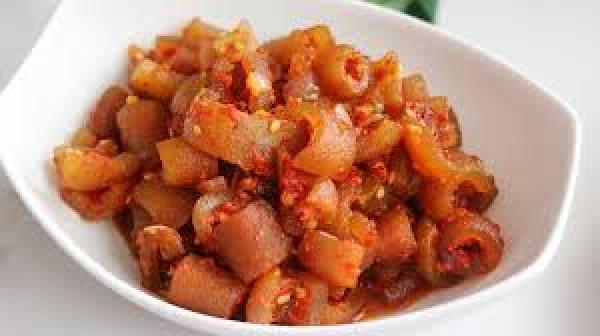
The Federal Government has cautioned that the persistent eating of hides and skins, commonly referred to as ponmo, represents a significant danger to Nigeria’s leather sector, which is currently estimated at roughly $5 billion.
Speaking during the National Campaign Against the Consumption of Ponmo held on Thursday, November 13, 2025, in Abuja, the Director-General of the Raw Materials Research and Development Council, Prof. Nnanyelugo Ikemounso, stated that the habit deprives domestic industries of essential raw inputs required for leather manufacturing and export.
Ikemounso disclosed that the Nigerian leather products market was worth $2.79 billion in 2024 and is expected to expand to $4.96 billion by 2033, cautioning that the ongoing diversion of hides for food consumption could hinder this projected growth.
“From an economic and industrial standpoint, cowhides are one of Nigeria’s most valuable raw materials. Our nation possesses a vibrant leather industry with enormous potential for job creation, foreign exchange earnings, and contributions to GDP,” he said.
“As of 2024, the Nigerian Leather Goods Market was valued at USD 2.79 billion, with a forecast to grow to USD 4.96 billion by 2033.
“Sadly, the continuous diversion of hides for ponmo consumption denies our industries access to quality raw materials, weakens our tanning and leather manufacturing sector, and diminishes Nigeria’s competitiveness in the global leather market.”
The DG outlined that the global leather value chain is estimated to be worth between $420 billion and $1 trillion, and with proper policy direction, infrastructure, and raw material availability, Nigeria can significantly increase its share of that market
He highlighted that the campaign was not designed to undermine cultural or dietary choices but to ensure that hides and skins are channelled into productive industrial use for national benefit.
“It is important to clarify that this campaign is not against tradition or personal food preference," Ikemounso said.
"Rather, it is a strategic intervention to prioritise the industrial use of hides and skins, particularly for leather production, which holds immense potential for economic growth, job creation, and export diversification.”
Ikemounso also raised health and nutritional concerns, describing ponmo as a delicacy with little or no nutritional benefit.
He said that it is mainly composed of collagen with negligible protein or micronutrient content, making it a poor source of nourishment.
The DG warned that many hides processed for consumption are treated with harmful substances such as formalin, diesel, and other non-food-grade chemicals, which pose serious health hazards, including organ damage and increased cancer risk.
“From a nutritional perspective, ponmo offers very little value. More worrisome, in many cases, hides used for ponmo are subjected to preservation and processing methods involving harmful substances such as formalin and diesel.
“These pose serious health risks ranging from organ damage to increased risk of cancer," he added.






















